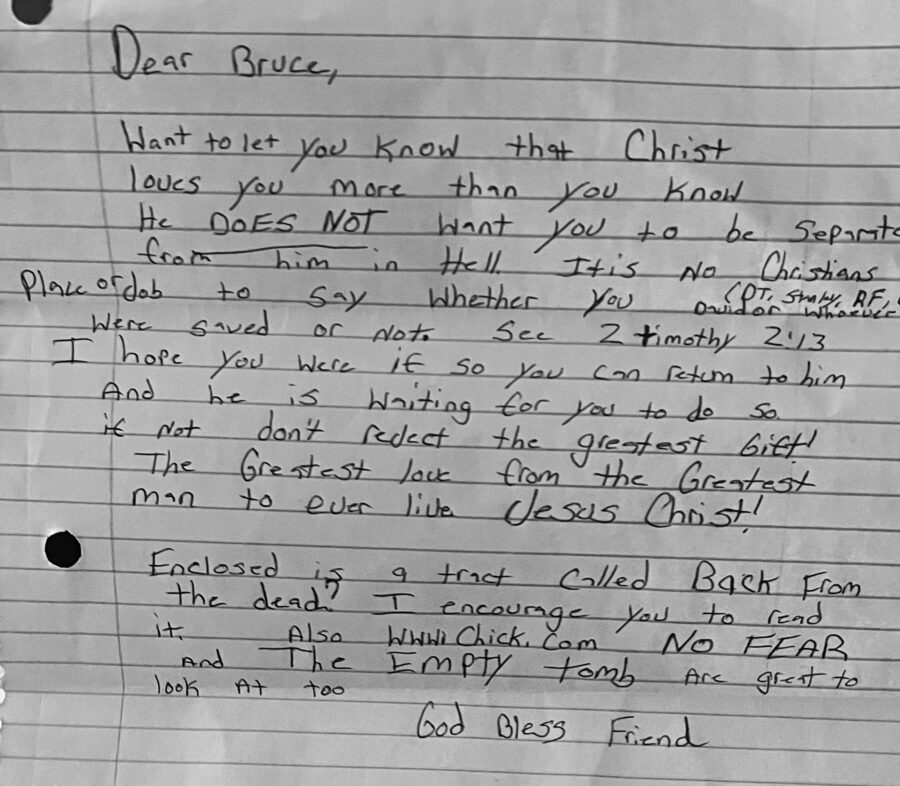
Part One — Part Two — Part Three — Part Four — Part Five
In 2007, as a Christian — barely — who was struggling with his faith, I started blogging. For a time, I found the Emergent (or Emerging) Church a welcome respite from Evangelical Christianity, but I eventually found its core beliefs lacking too. A year later, I publicly announced that I was an agnostic, and a few months later, an atheist. I dropped the “agnostic” moniker because I got tired of having to explain repeatedly what the word meant. Currently, I self-identify as an agnostic atheist.
As a Christian blogger, I was repeatedly attacked and harassed by Evangelicals for my “liberal” beliefs — both theologically and politically. Then, as now, Evangelicals took one of two positions about my “faith.”
- I never was a Christian.
- I am still a Christian, but under the chastisement of God.
In November 2008, I attended church for the last time. Throughout my journey from Evangelicalism to atheism, I have blogged about my experiences and beliefs. Countless Evangelicals have come to this site, determined to set me straight about my beliefs. Thousands of emails, blog comments, and social media messages later, I have noticed certain tactics Evangelicals use to repudiate or evangelize me. Evangelicals are, if anything, predictable. And, to be fair, all of us can be predictable. I know I am, though I generally try to engage people where they are. That said, I’ve become quite adept at sniffing out motivations. I’ve had commenters go out of their way to “hide” their Evangelical beliefs. Often, they will try to suck me in with science or philosophy arguments — which is all the rage on YouTube. Usually, I don’t engage in discussions or debates about the existence of God or the beginning of the universe. I know some readers revel in such subjects, but, for me, I’m not that interested. Not that I lack knowledge sufficient to engage in such discussions. I am confident that I can hold my own. I just don’t find these discussions interesting. Rarely do they lead to satisfying conclusions. So I try to stay focused on Evangelicalism (and the Independent Fundamentalist Baptist church movement) and the teachings of the Bible.
When commenters try to hide their Evangelical beliefs, I’ve become pretty good at cutting through their philosophical bullshit, forcing them to admit that they are not arguing for a generic deity, but the God of the Bible. Once they admit they are Evangelicals who base their beliefs on the teachings of the inspired, inerrant, and infallible Bible, I am ready to have a discussion with them. Sometimes, I will even grant their philosophical beliefs and then ask them how they connect this cosmic deity of theirs to the God of the Bible. Once trapped inside the pages of the Bible, it’s easier to discuss their beliefs.
This brings me to “Dr.” Arv Edgeworth. Edgeworth is an Independent Fundamentalist Baptist (IFB) evangelist from Ohio. Over the past several days, I have received numerous emails from Edgeworth, as has Carolyn, my editor. Edgeworth’s emails had an accusatory, judgmental tone, which is typical coming from IFB preachers. I have directly and pointedly answered Edgeworth’s emails (which you can read in the previous posts in this series). Not because I thought I could make a dent in Edgeworth’s thinking — you don’t argue Fundamentalist Baptists out of their beliefs. I’m content to engage such people, hoping that responses will be beneficial to others — especially lurkers. I have had Evangelical zealots who have engaged me in word-to-word combat return months later, admitting they were wrong or that they treated me poorly. I am always grateful when someone apologizes for their boorish behavior. Sadly, this doesn’t happen very often.
Unfortunately, some Evangelicals use their apologies as a ploy. This has happened often enough that I have a hard time accepting Evangelical apologies as genuine. The first question that comes to my mind is this: Is this a genuine apology? The second question is this: What are their motivations? Take Revival Fires (RF). RF is a terrible example of what it means to be a Christian. He has sent me numerous emails and left scores of comments on this site. He is a nasty, vile son of a bitch; someone who loves posting comments detailing prison rape and scat. Several years ago, I called out his behavior, using Bible verses to show that his behavior was not consistent with the teachings of the Bible. Afterward, I received a nice, respectful email from RF. He wanted to be “friends” with me. My response? Are you fucking kidding me? You shit on my doorstep, piss in my corn flakes, attack and harass my wife and children, and you want me to befriend you? Go fuck yourself. And get some therapy. Soon, RF went back to his putrid ways.
Other Evangelicals have taken this approach with me — mainly Independent Fundamentalist Baptists. I’ve received numerous apologies, only to have the person apologizing return to their hateful ways days or weeks later. As a result of past experiences, I am hesitant to believe people when they suddenly apologize after being so hostile towards me. Is their apology genuine? Time will tell, and I have found that most of them return to their hateful ways. Why? I can’t be certain, but I suspect hatred is part of their religious DNA. The IFB church movement, for example, is built upon a foundation of hate; not just ideas or beliefs, but people and institutions. When a Christian is exposed to this kind of thinking week after week, it is almost impossible for them to change their thinking. Possible, but hard. Typically, lasting change requires leaving the IFB church movement.
I’m sure you are thinking, Bruce, what the hell does this have to do with Arv Edgeworth? I know, I know, I’m a long-winded preacher. 🙂 Yesterday, I received the following email from Edgeworth:
I want to apologize, I have been pretty judgmental in my attitude, and I assumed some things I shouldn’t have. Sorry about that. In spite of our differences, maybe we can reach some common ground.
After this statement, Edgeworth took a conciliatory, friendly approach, attempting to connect with me. He sent me several more emails taking a similar tact. Is Edgeworth being genuine? I have no way of knowing. Time will tell. I certainly accept his apology, but the value of any apology is determined by how a person acts going forward. I don’t expect Edgeworth to agree with me or change his beliefs. What I do expect is that he treats me with respect and lets me tell my story on my own terms. I have had many delightful conversations with Christians over the years; people I had little in common with. It is possible for Evangelicals and atheists to get along. Possible, but not easy. Probable? Not likely, but I feel I should at least try to find common ground with people who hold different beliefs than mine. I’m not a debater. I prefer friendly back-and-forth discussions, say over dinner or a beer at the local pub. Sadly, many Evangelicals (and some atheists) take this approach instead:
This scene from Mars Attacks! — one of my favorite movies — shows how many people approach discussions about religion (and politics). I have no interest in eviscerating Evangelicals, including Edgeworth. I accept his apology, but time will tell whether it is genuine. If he reverts to the IFB norm, it is only a matter of time before I say or write something that will offend his Holy Ghost sensibilities. How will he react? I know how IFB preachers before him have acted, but maybe, just maybe, he will be an exception to the rule.
The ball is in Arv’s court. Will he see the ball? I don’t know, since he has repeatedly told me that he doesn’t plan to read this blog. That’s on him. I am more than willing to engage him in thoughtful discussion. One thing is for sure, Arv will get a lot more exposure as a result of our interaction. 🙂 I just did a Google Search on “Arv Edgeworth.” Three days in, and this site is already the third search result. 🙂 All praise be to Loki.
Saved by Reason,

Bruce Gerencser, 68, lives in rural Northwest Ohio with his wife of 47 years. He and his wife have six grown children and sixteen grandchildren. Bruce pastored Evangelical churches for twenty-five years in Ohio, Texas, and Michigan. Bruce left the ministry in 2005, and in 2008 he left Christianity. Bruce is now a humanist and an atheist.
Your comments are welcome and appreciated. All first-time comments are moderated. Please read the commenting rules before commenting.
You can email Bruce via the Contact Form.








